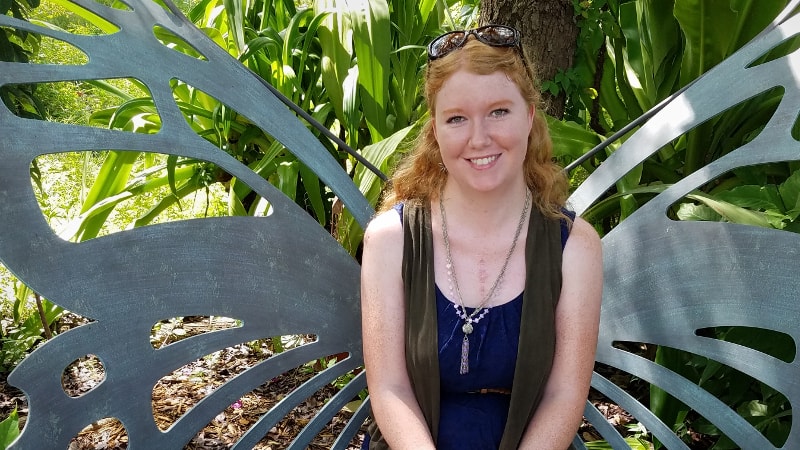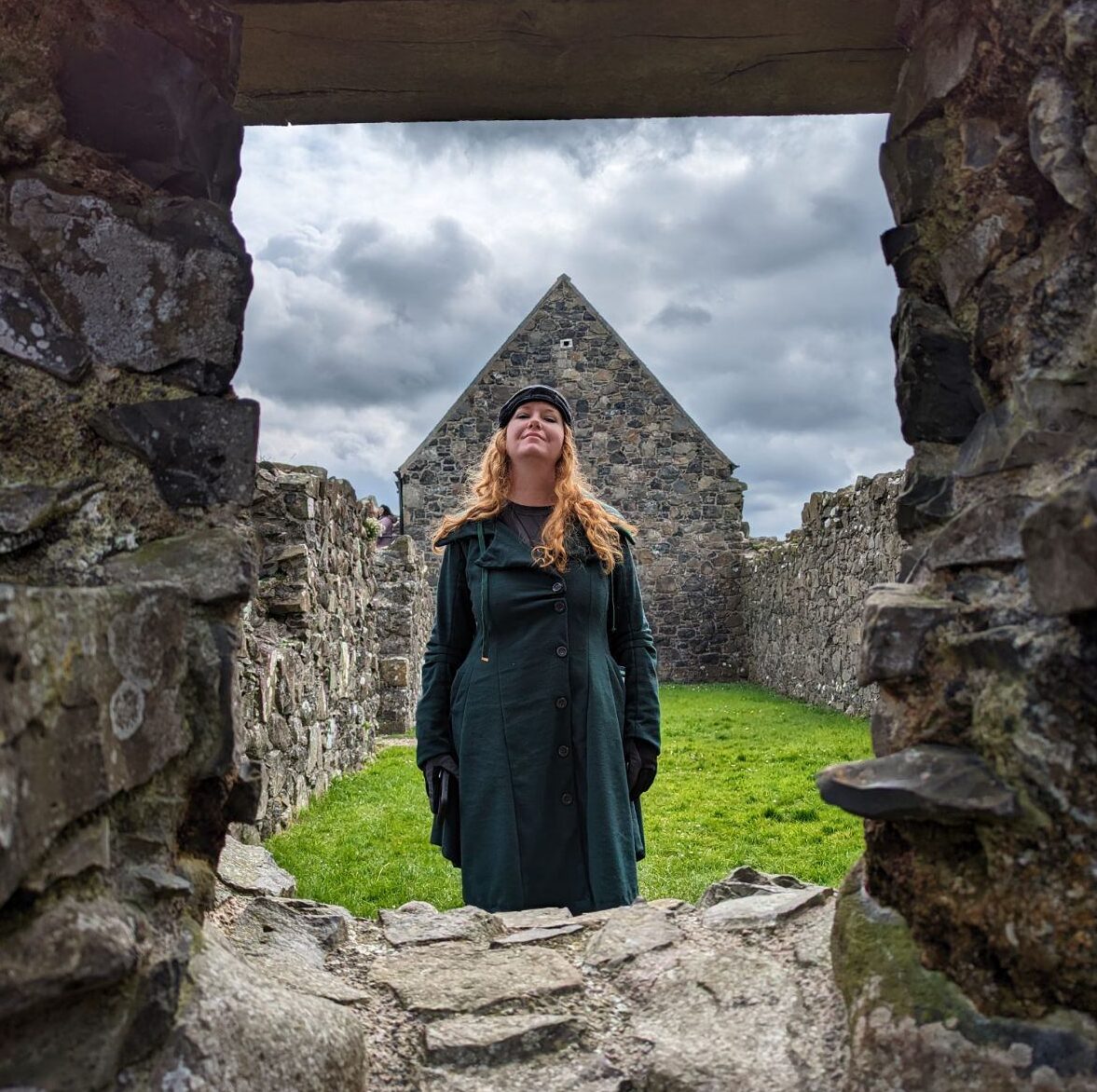Step into the imaginative world of Kim Berkley, a talented writer and narrative designer whose journey from childhood storytelling to crafting interactive fiction is nothing short of inspiring. In this interview, Berkley shares insights into their creative process, the development of their interactive novel “Shadow of the Curse-Eater,” and their vision for the future of interactive storytelling. With a blend of folklore inspiration and influences from choice-based games, Berkley offers valuable advice for aspiring writers and narrative designers. Join us as we explore the boundless possibilities of storytelling in the digital age with Kim Berkley.
Can you share a bit about your personal journey as a writer and narrative designer? How did you first get started in this field?
Sure! I’m not sure when exactly I started writing. I used to make stories up all the time as a kid, and in my teens I wrote a lot of fanfiction. But I wanted to be a visual artist at the time. It wasn’t until around high school that I switched to pursuing a career in writing, and it wasn’t until after college that I began my career as a video game journalist—which happened by accident while I was looking for work writing for games, rather than about them. I did that for a few years, then got a “real” job copywriting for a marketing company. It was during that time that I decided if no one was going to pay me to write for games, then I would write my own. And I did.
I eventually left that marketing job and went back to balancing freelance work with my fiction. Nowadays, people are paying me to write for games; recently, I’ve been doing a lot of freelance work in localization, which involves proofreading and editing roughly translated video game dialogue and in-game text to polish it up and make it flow more naturally (and just generally sound cooler).

What motivated you to pursue interactive fiction, specifically blending elements of traditional novels with reader-driven narratives?
It’s something I’ve been thinking about for a long time. I read my first Choose Your Own Adventure novel when I was pretty young, and I remember being blown away by the idea of a story that could change every time you read it—a story that you could play an active role in, instead of just observing. I inherited a love of both books and video games from my family; we’re all big readers, and I used to watch my father and brother play games on the family PC before I started playing them on my own. Once I got older and decided I wanted to tell stories for a living, I figured I didn’t have to choose between my loves; I wanted to try my hand at writing a story that was also a game. That’s how my first full-length IF novel, The Harbinger’s Head, came to be. I then took the lessons I learned from creating that one and ran with the idea, creating another short IF novella and a demo for a visual novel before I began developing Shadow of the Curse Eater.
Could you describe the process behind creating “Shadow of the Curse-Eater”? What were some of the key challenges you faced during its development?
The biggest challenge I’ve faced during this project is creative burnout. I’ve been telling stories for a long time and have been writing professionally for over 10 years, and I’ve never experienced real burnout. But last year brought a lot of major life changes and a lot of work my way, and I put myself under a ridiculous amount of pressure to keep juggling more and more balls without missing a beat. Eventually, it caught up to me. I was forced to learn how to say “no” to opportunities, even ones I’d have liked to pursue, in the interest of keeping my overall workload manageable, and I got a crash course in prioritizing work and projects that really matter to leave myself space to breathe. I also wound up taking an extended break from writing, and while I’m back at it now, I’m still very much entrenched in the burnout recovery process.
You mentioned drawing inspiration from folklore and choice-based games like Dragon Age and Baldur’s Gate 3. How did you incorporate these influences into the world-building and gameplay of your interactive novel?
Shadow of the Curse-Eater is my biggest project to date, with a much larger scope in terms of the story and especially the cast compared to my previously published works. There are seven major characters with whom your character may become friends, enemies, or even lovers, and it’s vital to me that those relationships feel natural and satisfying for the player, no matter what direction they take. I look to RPGs like Dragon Age and Baldur’s Gate 3 for inspiration because they have some of the most memorable characters and relationships I’ve ever encountered in video games.
In terms of folklore, SotCE is rife with references to folklore from around the world, though it is set in a world of its own. It’s a world populated by humans, but also by wilderfolk—semi-human characters of a wide variety of shapes and sizes. These include fairies, merfolk, fauns, harpies, fox spirits, and were-creatures, just to name a few.

As a freelance writer and fantasy author, what strategies do you use to stay creatively inspired and motivated throughout your projects?
One major lesson I’ve learned is that there must always be space built into your calendar for rest, relaxation, and play. The best inspiration comes from unexpected encounters, and those can only happen when you take a break and go exploring, whether by going on an actual trip or simply following your curiosity down a random research rabbit hole. It’s great when work feels like play, but if you write constantly and never stop, the reservoir will drain and you will have nothing with which to refill it. Trying to create without any creative reserves whatsoever isn’t just difficult, it’s painful, and terrible for your mental and physical health.
So to avoid burnout and stay motivated, I limit myself to how much I will work per day, and I do my best to portion out my time realistically. I use both pen and paper and an online calendar to block out time for various tasks and keep track of my many (many) to-do lists and deadlines, and I always make sure to leave time for hanging out with friends, playing games, reading books, and going on adventures. I’ve also been doing my best to schedule weekly artist dates for myself whenever possible.
What role does feedback and playtesting play in the iterative process of refining your interactive fiction? How do you balance incorporating reader input while maintaining your artistic vision?
I always snag both beta readers and beta testers for my IF projects; it’s a vital part of the process. Once the script has been written, edited, and revised, I ask beta readers to review it in full. The feedback from this stage is always interesting, because these readers are experiencing every version of the narrative at once, in a way no one else will, but it helps me to catch inconsistencies and possibly explore options that didn’t occur to me previously. Once that round of feedback has been reviewed and incorporated, I get beta testers to play through the game as it’s meant to be played, one route at a time (as many as they are able/willing to explore). This stage is mostly about catching coding errors and route-specific continuity issues. Once this round of feedback is reviewed and incorporated, I put one last bit of polish on the game before it goes out into the world.
Reflecting on your journey, what advice would you give to aspiring writers or narrative designers who are interested in creating their own interactive fiction projects?
The best advice I can give is to read. There are many types of IF stories, and it’s good to at least sample them all, whether to help you decide which type you’d like to create or to help you come up with innovative ways to develop an idea you already have. (Plus, it’s fun.) I’d also suggest playing some RPGs for inspiration. Whatever calls to you, be it a video game or a tabletop game, check it out—and pay attention to how it feels to play. What felt good? What do you wish had been done differently? These questions can help spark so many ideas, some of which you’ll use and some of which you’ll tuck away for a future project.
To add something perhaps a little less obvious—I’d also strongly suggest checking out Twine or a similar option for plotting out your, well, plot. I planned The Harbinger’s Head entirely with pen and paper, and it was so hard to keep the different branches of the narrative organized. It’s probably one of the reasons the story wound up a little short (which was the main thing most of the reviews complained about!). If you strongly prefer pen and paper, then make sure you have a solid system in place for how you will organize your notes and outlines—because you will need them. If you don’t have a system yet, do some research, try out a few, and see what sticks. There’s no one right way to do it, but it’s important to find a way that truly works for you.
What are your thoughts on the future of interactive storytelling, particularly in the digital space? How do you see the genre evolving in the coming years?
I think AI is going to be interesting. It may be that AI applications can help streamline the plotting process for branching narratives, and I can even see incorporating some AI into the games themselves—perhaps for side conversations between characters. At the same time, it’s also going to make it really easy for people to copy work or spit out fully AI-generated games in minutes—trash without any heart, soul, or satisfying conclusions. (It’s already happening with traditional fiction, unfortunately. Keep your eyes peeled for AI-generated knockoff books when buying online.)
AI aside, I’m somewhat hopeful that the IF community will grow a bit in the years to come. Video games as a whole have gone fully mainstream, and more and more games are placing heavy emphasis on storytelling rather than gameplay alone. And a few text-only games and visual novels (such as Disco Elysium and Doki Doki Literature Club) have really gained traction in recent years. I wouldn’t be too surprised, but very happy, if we saw the lines continue to blur between traditional fiction, IF games, and “regular” video games in the near future. I’m always excited to see where our stories will take us next.
Beyond “Shadow of the Curse-Eater,” do you have any future projects or collaborations in the works that you’re excited about sharing with your audience?
Absolutely! The Dragon’s Last Flight will be first on the docket as soon as my work on SotCE is complete; it’s been stuck in the alpha stage for a while now, and I’m very much looking forward to finally finishing it and being able to share it with my current (very patient) readers as well as new folks. I’ve also got a full first draft of a novel/novella (not sure which it will be yet) waiting for first edits, and quite the long wishlist of projects I’d like to tackle after that. I’m never at a loss for ideas; I just never seem to have enough time for them all!
Finally, how can readers and fellow writers connect with you to learn more about your work and stay updated on your latest projects?
The best way to keep in touch with me and my projects is to sign up for my newsletter via my website; in addition to receiving monthly updates, my newsletter readers are usually the first to know about big announcements and always get first dibs on signups for beta reading or testing opportunities. I’m also on Instagram, Facebook, and LinkedIn.






